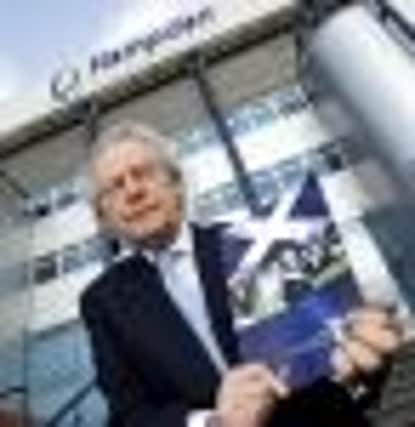McLeish targets sectarian ‘dark side’


The Offensive Behaviour at Football and Threatening Communications (Scotland) Bill, introduced in the wake of last season’s controversies which saw Celtic manager Neil Lennon suffer multiple threats to his personal safety, has been criticised by supporters of both Old Firm clubs who claim it will criminalise freedom of expression.
But McLeish has dismissed the reservations expressed about the bill, some of which come from his Labour Party colleagues who have indicated they will oppose it at Holyrood, and provided his personal backing to First Minister Alex Salmond’s approach on the issue.
Advertisement
Hide AdAdvertisement
Hide AdSpeaking at Hampden where he was assessing the progress made by the SFA in implementing his wide-ranging Review of Scottish Football, McLeish stated the measures are justified in order to eradicate conduct which damages Scotland’s standing abroad. Celtic face a Uefa disciplinary hearing today over alleged illicit chanting at their Europa League fixture against Rennes last month.
“Yes, I support the bill,” said McLeish. “If we want to have a game attractive to more than the core fan base, to women, children and those who have maybe never been to a game in the past, then there is no doubt in my mind that there are excesses and a darker side to Scottish football that we have to get rid of.
“I make no apologies for saying that. The clubs are not entirely responsible. Sectarianism is an issue for Scotland which has manifested itself at football grounds. So it’s not a matter of just blaming Rangers and Celtic. But along with the two big clubs, the other clubs, the SFA and SPL, we have to show the outside world that we mean business. We need to be tough.
“Alex Salmond is right. This is an embarrassment to Scotland. It is besmirching Scotland’s reputation. We are blessed in this country that we have freedom of speech. But there is a distinction to be made between free speech and behaviour regarded as intimidating, irritating and, by the laws of the land, illegal. If you love football as I do, then you have to own up to the fact there are aspects of the game that have no place in a modern Scotland or in modern football. I care passionately about how the country is viewed. I think it’s important the government get this bill done and dusted and get on with it. Then it’s over to the authorities, the police and others, to implement it.
“I’d also like to see greater self responsibility. At the end of the day, it would be good if Uefa, Stewart Regan at the SFA or Neil Doncaster at the SPL were not involved in any of these things. Let’s hope in the future we can take more control of our own game, so we don’t need to get the government involved.”
Celtic were cleared earlier this week of breaching SPL rules following an investigation into a report of pro-IRA chanting from supporters during a match against Hibs in October. The SPL have subsequently announced amendments to their unacceptable conduct rules, which will be voted on by all 12 clubs later this month, including the outlawing of “songs, chants and behaviour referring to terrorist organisations.”
McLeish is encouraged by the prospect of a firmer stance on the issue from the national football authorities as he looks forward to what he regards as a blight on Scottish football being steadily weeded out. “I think the authorities are changing on this,” added McLeish. “
“They have been encouraged to do so, but I think there is enough goodwill around to make sure that these issues are tackled. We have heard both Neil Lennon and Peter Lawwell from Celtic talking recently about the need for the chanting to stop. In the future, that will be backed up by tougher powers on behalf of the clubs, of the football authorities and the government. The game has got to reach out to the rest of Scotland. Up until now, it has been very insular and exclusive, with an attitude of ‘we know what we should be doing’.
Advertisement
Hide AdAdvertisement
Hide Ad“But if we are looking to be more appealing to broadcasters and sponsors, if we want more support from the government, if we want to attract more of the public to our grounds, then we need a different story. It’s not the biggest issue in Scottish football but I want to see everything that is an obstacle in our path of progress being dealt with as thoroughly as it can.”